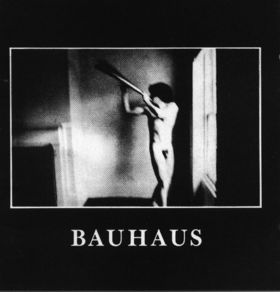One of the strongest debut albums ever released? Me votes! I want to start by telling how I first heard this band and bla bla bla but what does it matter how or when I came across these masterminds. What IS important though is that after reading to this 2 or 3 pages of junk (junk is attractive believe it or not) I might be successful in bending you to listen to this record.
Although Bauhaus is popularly believed to be a proto-goth band, I personally think they have a lot common with experimental music and art rock. Having said that, this album is their most gothic release to date and one which I adore the most.
“Dark Entries” as the opening track could not have been an accident. In many ways, it does set the tone for the rest of the album: Murphy’s weird, flat chants and yelps set against the unsettling backdrop of guitar feedback and squeals, heavy bass, and marching band drumbeats. Say what you want about Bauhaus and their frequent pretentiousness: they were fucking COOL.
After the pummeling beats of “Dark Entries,” the next song, “Double Dare” almost seems leaden, like some ridiculous version of an old Black Sabbath tune. It all sounds atonal and unhinged; something that would certainly drive parents crazy. Murphy ramps up the crazy vocal acrobatics and there’s scarcely a chorus in sight. (This style would later reach its apex in the almost-unlistenable “Swing the Heartache” from 1982′s The Sky’s Gone Out.)
Both David J’s bass and Kevin Haskins’ drumming are just fantastic on “In the Flat Field,” like some kind of controlled, bubbling cauldron. (Although I didn’t consciously realize it at first, Haskins’ style is awfully similar to the “Burundi Beat” drumming of Adam and the Ants, who I genuinely adore). Here we are also introduced to Murphy’s terrifically ludicrous, nonsensical lyrics: Yin and Yang lumber punch/Go taste a tart, then eat my lunch. What the eff, dude. Still, it sounds really good.
It puzzles me that “God In An Alcove” didn’t make it onto 1979 – 1983 as it’s definitely one of Bauhaus’s best songs, both lyrically and in terms of Daniel Ash’s guitar playing. (Okay, maybe the “Now I am silly” bit is a bit . . . silly.)
Damn it if “Dive” doesn’t full on rock, as much as a band like Bauhaus could rock, with cacophonous saxophone courtesy of Daniel Ash (and lyrics not unlike Duran Duran’s “Late Bar” from their own debut album). I’m also particularly enamored of “Spy in the Cab” with its squelchy, squirt-y keyboard flourishes and flair for espionage. Here Murphy actually sings instead of screaming. The ending vocalizations must have influenced a very young Brian Warner a.k.a. Marilyn Manson.
“Small Talk Stinks” is next, and the title says it all. You can also hear David J. on vocals. To me, this is an archetypal Bauhaus song, the kind that separates the casual fan from the hardcore one.
I must have listened to the radio broadcast of “St. Vitus Dance” dozens of times a year before I heard the record, desperately trying to discern what the hell Peter Murphy was singing. The Jew’s-harp-style keyboards fascinated me to no end, as did Murphy’s ability to shriek like a crazed banshee at the end. (The TeamRock radio RJ who played this called it “St. Vitrus Dance,” which still makes me laugh.)
Still, in terms of sheer self-indulgent lunacy, nothing can top “Stigmata Martyr.” David J’s low, insistent bass, which would later come to comprise most of the post-Bauhaus project Tones on Tail, is omnipresent. As a recovering Catholic and someone who simultaneously adored and was terrified of The Exorcist (I had to search this trivia though), it was impossible not to be totally enthralled by Daniel Ash’s outlandish guitar feedback and Murphy’s Latin chanting.
The album ends with the seven-minute-plus “Nerves,” featuring more of that rolling Haskins drumbeat offset by plinky, out of place piano. There is also something completely satisfying about Peter Murphy’s voice here.
Although I had more than one argument with people back in the day over whether or not Bauhaus sucked or was truly awesome, I like them, even though in retrospect, I admit that the arguments of pretentiousness are not without some merit.
– Shams Uz Zuha


